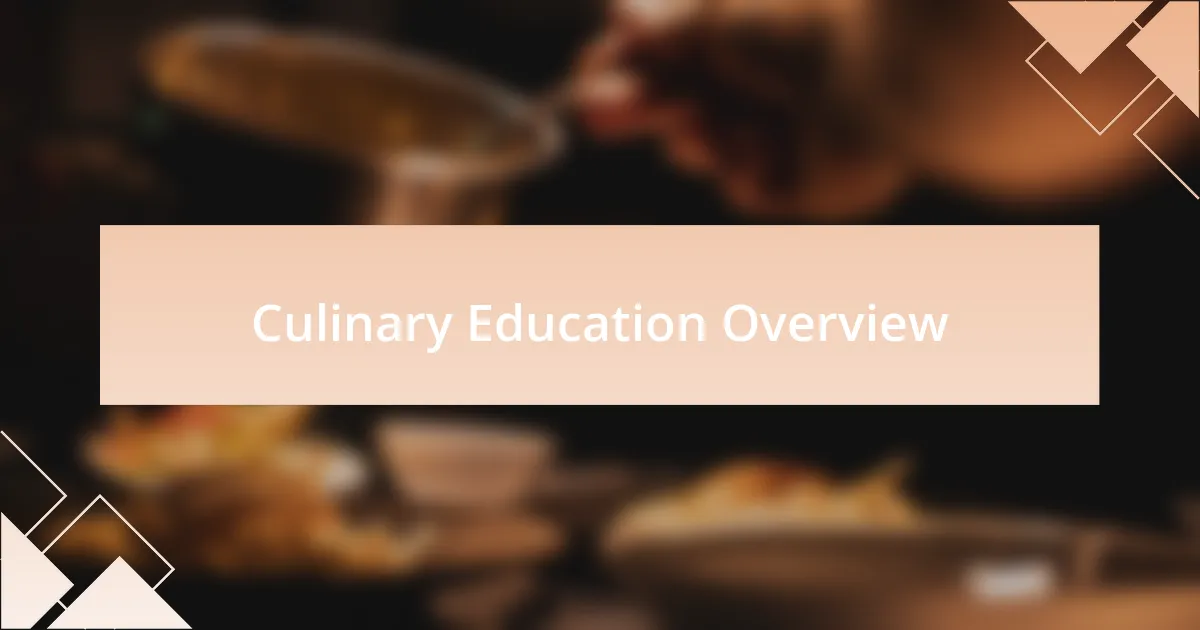Key takeaways:
- Culinary education enhances our relationship with food by deepening our understanding of flavors and ingredients.
- Spices play a crucial role in cooking, offering both flavor enhancement and health benefits, while encouraging culinary creativity.
- Middle Eastern cuisine showcases a rich blend of spices that reflect the region’s diverse cultures and history.
- Personal experiences with favorite spices, like saffron and cumin, highlight their impactful role in creating memorable meals and connections.

Culinary Education Overview
Culinary education is more than just learning how to cook; it’s a journey into the rich tapestry of flavors and techniques that define global cuisines. I remember my first class, where the instructor shared the history of spices and how they shaped cultures. It opened my eyes to the idea that each dish tells a story, connecting us to different parts of the world.
When I think about the skills gained through culinary education, I can’t help but marvel at how it transforms our relationship with food. Have you ever considered how understanding the role of spices can elevate a simple dish into something extraordinary? It’s fascinating how a sprinkle of za’atar or a dash of sumac can influence not only the taste but also the experience of a meal, inviting everyone at the table to explore new dimensions of flavor.
As we delve deeper into the culinary arts, we not only develop practical skills but also gain a profound appreciation for the ingredients we use. I often find myself reflecting on how much more enjoyable cooking becomes when we know the stories behind our favorite spices. Think about it: isn’t it enriching to cook with intention, knowing the cultural significance and culinary history that each spice carries?

Importance of Spices in Cooking
Spices are the heartbeat of cooking, essential for transforming ordinary ingredients into memorable dishes. I still recall the aroma that enveloped my kitchen the first time I used saffron in risotto. It’s incredible how just a pinch can evoke emotions, memories, and even vivid images of distant lands. How can something so small wield such power over our senses?
The importance of spices goes beyond flavor; they also bring health benefits to the table. For example, the warm essence of turmeric not only brightens a dish but also offers anti-inflammatory properties. Have you ever thought about how cooking with spices can be both a creative outlet and a way to nurture your well-being?
Ultimately, spices allow us to explore our culinary boundaries. I remember experimenting with harissa in a classic chicken stew, which took the dish from familiar to exciting. Each time I incorporate spices, it feels like a personal invitation to my taste buds, beckoning them to embrace new experiences. What’s stopping you from bringing more spices into your kitchen adventures?

Introduction to Middle Eastern Cuisine
Middle Eastern cuisine is a treasure trove of flavors, deeply rooted in history and tradition. I remember my first exposure to a bustling market in Istanbul, where the enticing scent of cardamom and cumin blended seamlessly in the air. It’s fascinating how the region’s geographical diversity has given rise to a colorful palette of ingredients and cooking techniques that are as varied as the cultures within.
One of the defining aspects of Middle Eastern cuisine is the harmony of spices that reflect the landscape and the people. From the citrusy brightness of sumac to the earthy warmth of za’atar, each spice adds a unique layer to dishes that speak volumes about the region’s rich heritage. Have you ever considered how food can tell stories of generations, reflecting relationships and traditions? I can still feel the comfort of gathering around a table for a shared meal, where every bite we took felt like a connection to our roots.
Moreover, the communal aspect of dining in Middle Eastern culture enhances the experience. I cherish the moments spent enjoying a spread of mezze with friends, where the vibrant colors and enticing aromas invite conversation and laughter. It makes me reflect on how food transcends just nourishment; it brings people together, creating memories that linger long after the meal has ended. Exploring Middle Eastern cuisine feels like embarking on a journey into the heart of its people and their stories.

My Favorite Middle Eastern Spices
When I think of my favorite Middle Eastern spices, saffron instantly comes to mind. The first time I used it, I was in a small kitchen, watching the vibrant golden strands infuse a pot of rice with their rich aroma and color. Have you ever experienced a spice that transforms a dish into something truly special? For me, saffron does just that—turning a simple meal into a fragrant feast that brings joy.
Another spice I adore is smoked paprika. I remember experimenting with it while preparing a traditional shakshuka one Sunday morning. The smoky notes combined with the sweet tomatoes created a symphony of flavors that made my taste buds dance. Every spoonful reminded me of the vibrant markets where I first discovered this gem, surrounded by the hustle and bustle of life.
Lastly, the earthy goodness of cumin has a special place in my heart. I can still visualize the moment I first added it to a lentil soup, and the warmth of its flavor enveloped me like a cozy blanket on a chilly day. Isn’t it incredible how certain spices can evoke such strong memories? For me, cumin isn’t just an ingredient; it’s a reminder of family dinners filled with laughter and storytelling.